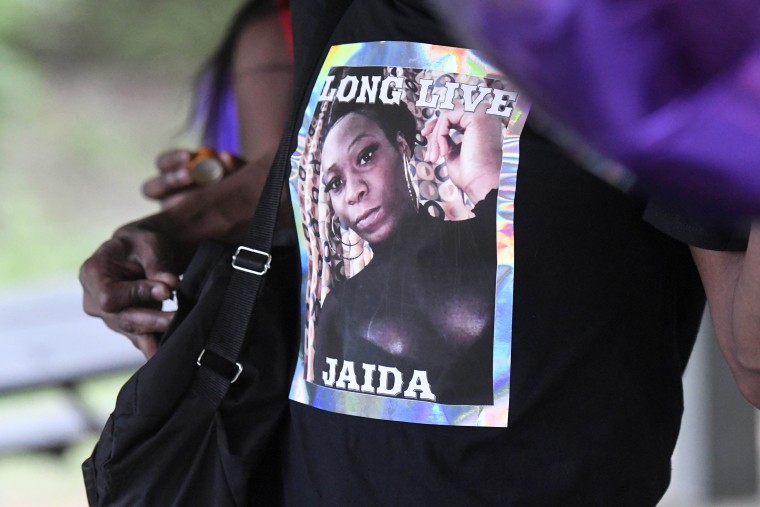Police arrested two men in Charlotte, North Carolina, on Friday in connection with the shooting deaths of two Black transgender women whose bodies were found in hotel rooms less than two weeks apart.
Police found the first woman, Jaida Peterson, at the Quality Inn & Suites Airport on April 4 and the second woman, Remy Fennell, at the Sleep Inn University Place on Thursday, according to the Charlotte-Mecklenburg Police Department.
The cases were so similar — both victims were Black trans women, were engaged in sex work and were fatally shot in hotel rooms — that police issued an “urgent” message to the LGBTQ community, particularly those engaged in sex work, during a news conference Thursday evening.
Rob Tufano, the department’s public affairs director, said sex workers needed to be “hypercautious, hypervigilant in who they’re engaged with” and aware of their surroundings.
On Friday, police announced they arrested two men whom they allege were both involved in the killings. Dontarius Long and Joel Brewer were each charged with two counts of murder, two counts of possession of a firearm by a felon, one count of robbery with a dangerous weapon and one count of conspiracy to commit robbery with a dangerous weapon.
Following the announcement, Lt. Bryan Crum said during a Friday news conference the department doesn’t believe “there’s any further risk to public safety.”
“I can tell you that our investigation has advanced to the point that I feel confident in telling you there is no one else at large that was a part of this,” he said.
Investigators are still looking into the suspects’ alleged motives, Crum said, and they’re working with the FBI to determine whether the killings could be considered hate crimes.
“If hate crime charges are appropriate, we will absolutely pursue those,” he said.
Peterson and Fennell are among 15 transgender people killed so far in 2021, though that number could be higher because police often deadname and misgender them — use a trans person’s name and pronouns assigned at birth — in reports about their deaths. So far, nine of the known trans victims are Black trans women.
Prior to the arrests, advocates in Charlotte said Black trans women were scared.
“Many of them use hotels as their primary form of housing, and they don't feel safe to be there right now,” Ash Williams, a trans organizer in Charlotte, said. “So, many of us are moving up to try to raise funds for safer, nonhotel housing for the Black trans women that live in Charlotte.”
But even after the arrests, Williams said trans people in Charlotte don’t feel safer, because police “criminalize” Black trans sex workers.
“We keep us safe,” he said. “The police do not keep us safe — they made that clear last week when they deadnamed and misgendered Jaida, so we don't give a f--- about what the police are talking about.”
In a statement to NBC News, Tufano said "Community members should have an expectation to live and work without the fear of violence."
He added "Because of the tireless work of members of the CMPD, two dangerous people can no longer prey on vulnerable members of our community. The arrests will never bring back the lives of the two innocent souls lost, but may bring some measure of peace to their loved ones."
After the shootings, Charlotte groups House of Kanautica, Charlotte Uprising, Feed the Movement CLT and End Trans Hate in North Carolina began raising funds to help safely house Black trans women and sex workers, potentially in long-term Airbnbs.
Eventually, activists would like to start a housing initiative similar to My Sistah’s House in Memphis, Tennessee, where a group is building tiny homes for Black trans women.
In the meantime, Williams said Black trans women will continue to push for the same support they’ve demanded for years: better access to hormone therapy, employment and housing.
“They're underemployed or not employed because people don't want to hire them,” he said.
“That's the reality that the girls are dealing with every single day,” he added. “They deserve housing all the time — not just when a lot of girls are getting killed in our community.”

